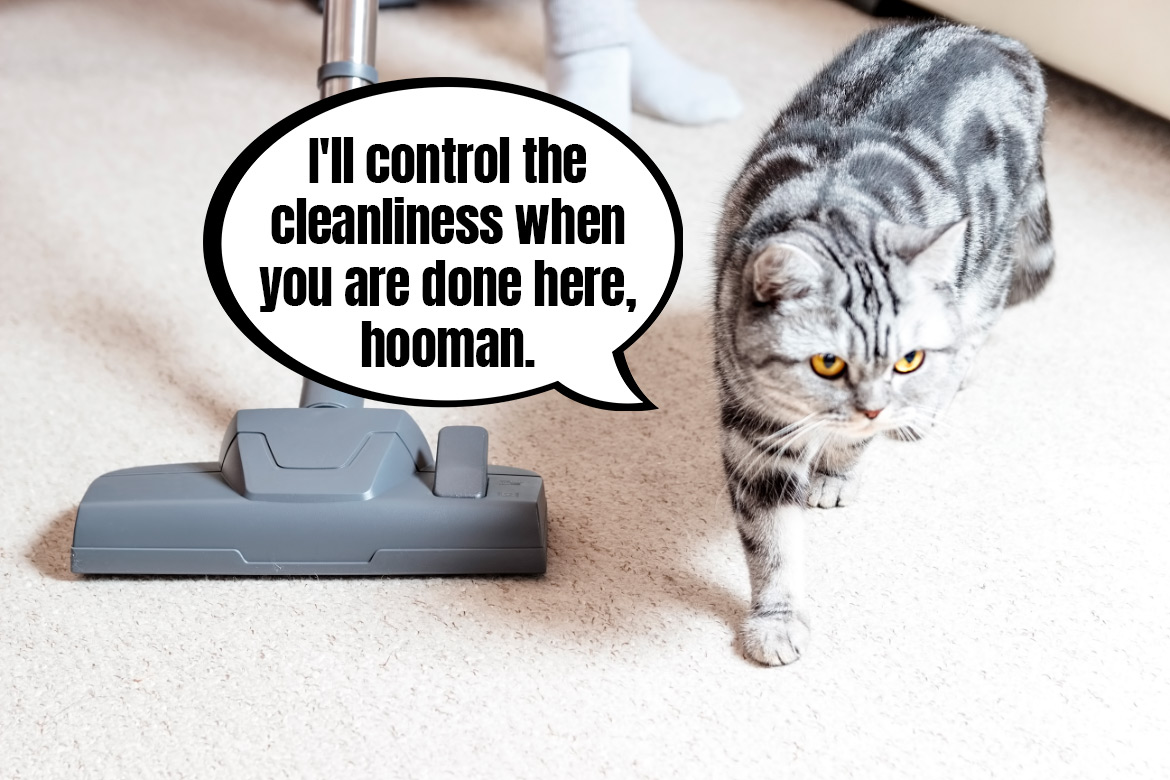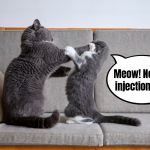Have you ever seen a cat sneeze, fabCats? Though sneezing, snorting and watery eyes can be symptoms of cat flu and FCV – a contagious viral infection, no worries, fabCats – it doesn’t always need to be that serious 🙂 Our furs, just like hoomans, can be allergic to many things in their environment. We often hear about them being allergic to certain types of food, but can cats react to bug bites, dust or pollen? Today we explore that a little closer.
Allergies in cats – what causes them?
Sticking to the standard definition, an allergy is a sensitivity of the body and the immune system to certain external factors. The definition can be applied to both people and cat allergies and can include food allergies as well as being sensitive to particular medicine, plants, pollen, dust and even bug bites or parasites.
In the case of cats, food allergies are definitely the most common ones, but right after them come allergies to parasites, with fleas leading the way here, as well as environmental allergies. What’s interesting is that because their bodies are more sensitive, cats can be allergic not just to the standard dust or pollen – they can have allergic reactions to our perfume, cigarette smoke or even cleaning supplies we use around the house. We ourselves always look at what we use to clean the spaces our cats can get into, like our floors and countertops, and we always make sure to avoid chemicals when we wash the myKotty cat beds our cats sleep on.
Can cats be allergic to dust and pollen?
Sure they can! And unfortunately, just like it is for us, people, we can’t eliminate all the allergens because of the environment we live in. Grass pollen, dust, saprophytes, fungi, mold – we’re bound to have them around on a daily basis, all year round and even when we do all we can to keep our houses clean. Let’s remember that cats live much closer to the floor than we do – superficial cleaning often isn’t enough if there are dust bunnies under the bed and our cats can’t wait to put their noses in them.
If it turns out that our cats are allergic to some environmental factors and we are able to identify what’s the cause for the allergic reaction, the first and most important step to take is to be proactive – besides regular cleaning we might need to use devices designed to clear the air and humidify it, just to improve the quality of air we and our cats breathe in.
What are the signs of allergy in cats?
A lot depends on the individual cat and their predispositions, their health and allergens that cause the reaction. When it’s pollen or dust, your cat could have mucosa reddening inside their nose, their eyes watering, they could sneeze, have swelling or a sore throat, which are the symptoms any cat Carer who is also allergic to pollen knows all too well. Unfortunately, even if we suffer from allergies and have medicine to ease the symptoms at home, we should never give it to our cats – let the vet investigate the case and decide if your cat needs any medication or if any other support is necessary to prevent the symptoms returning or getting worse.
Besides the typical respiratory reactions, cats can have dermatological issues caused by different allergies. A cat that’s sensitive to pollen, dust, bug bites, parasites or even certain ingredients in their food could have very itchy skin and want to scratch it so intensely, it leads to wounds, inflammations and infections. In some cases allergies can cause atopic dermatitis. What then? Besides pharmacological support and eliminating the allergens from the cats’ environment, sometimes it’s necessary to use a protective cover (like a jumper or a cone) that will prevent the cat from reaching to the wound and scratching it until it heals up completely. With a fur stomping around on every possible surface, sharpening their claws on a scratcher and being very particular about their daily hygiene, we can’t risk leaving them with an unsupervised, easy access to fresh wounds.
Allergy treatments are for the patient
We don’t want to scare you, fabCats – any worrying symptoms of your cat buddies should be brough up with the vet and taken care of. Getting a grip on allergies is possible, even if the road to get there is long and the outcomes are big because allergies can be quite hard on a cat’s body and make them suffer a lot. However, to diagnose and treat allergies in cats, you have to be very patient – there are many specialists in the field, but finding out the cause of allergic reactions is difficult and usually includes eliminating things one by one until you find the right one. We, as Carers, can help our cats by observing them, their behavior, environment and watching for any situations when the allergic reaction gets stronger.
To drop you an example from team myKotty, Tosia had a completely unexpected allergic reaction this year and she ended up with a swollen eye, sneezing and the need to get medicine, which she wasn’t happy about. Finding the cause of that would be extremely hard, but her Carers noticed that the sneezing and eye watering started right after she spent her first warm day on the balcony. Conclusion? Some pollen particle must’ve gotten into her nose and irritated her sensitive airways, which caused quite a lot of suffering. Fortunately, they were all able to treat it quickly with proper medicine and since then the allergy didn’t come back despite Tosia spending her time on the balcony and the trees losing a lot of pollen right now.
What’s the moral of the story? If it wasn’t for Tosia’s Carers being aware of her customs and behavior, finding the cause of her allergy could’ve taken a long time. And if it wasn’t for a quick visit to the vet clinic, her watery eyes and sneezing could’ve been just the beginning of her issues. After all, the cause could’ve been any cleaning supplies, dust, pollen, the fact that the neighbor was smoking cigarettes on the balcony nearby or the pesticides that the producers used on apples that Tosia’s Carers brought home and she decided they smell wonderful and wanted to roll around in the bag 🙂
For the sake of your furs, dear fabCats, we keep our fingers crossed they never have to deal with unidentified allergies! But if you have experiences with those already and want to share with us or drop any suggestions that helped you through the tough times – let’s discuss in the comments.




